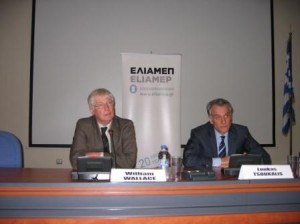It is a matter of general acceptance that the Obama administration is largely different from its predecessor. The US’s renewed commitment to multilateralism and willingness to listen, arguably poses the question to its European counterparts. What do we want to say in response? This was addressed in a Lecture organised by ELIAMEP with Professor Lord William Wallace on April 14th, 2009.
According to Prof. William Wallace, it is a matter of interest to note that from the American point of view, the EU is regarded as a unity, possibly a federation in the making. In this framework the EU is viewed as a part of the western ‘free’ world, of which the natural leader remains the USA. This perception, however, comes in sharp contrast with the current image of fragmentation that the EU is projecting and the lack of coherence among the Europeans.
The policy priorities of president’s Obama administration as they have been set up to this point focus on reviving multilateral institutions, placing nuclear proliferation and climate change back on the agenda, reducing American energy dependence, fostering progress in global economic and financial management and engaging with East Asia and the Muslim world. At the same time, it has inherited a global financial crisis, commitments in Iraq and Afghanistan, an unsustainable defense budget and unclear internal positions as to America’s energy question.
On the opposite side of the spectrum, while the EU and the USA do share a set of common interests and objectives, they also have important differences, foremost the lack of any coherent global agenda, with the partial exceptions of climate change and economic policy. Characteristically, as the power gravity is gradually shifting to the East, the EU should outline a coherent collective policy towards China and South Asia, where currently only the British, according to Prof. Wallace seem to have an active interest mostly on Pakistan and Afghanistan. Moreover, while both sides have shown signs of rapprochement towards Russia, the EU needs to map an independent position both due to its territorial contiguity as well as its energy dependence from Moscow. On the issues of climate change and global economic management, while the EU appears to be on a good line, in practice it does not appear to have a coherent external policy for the euro nor for the efficient implementation of policy targets. Finally, the EU should address the relationship with NATO in order to shift the attention directly on the ‘bilateral’ EU-US relations and learn to put its interests across more coherently.
Overall, in order to be regarded as a trustworthy and independent partner in global affairs, the EU has to set clear targets and concrete paths on how to accomplish them. European heads of government need to find common messages and put them across both to the US administration as well as the US public. Only in this way will the EU be able to abandon the image of ‘follower’ to the USA and be finally able to explain what European interests are, where they coincide with American interests and where they differ.
William Wallace’s CV in PDF.




